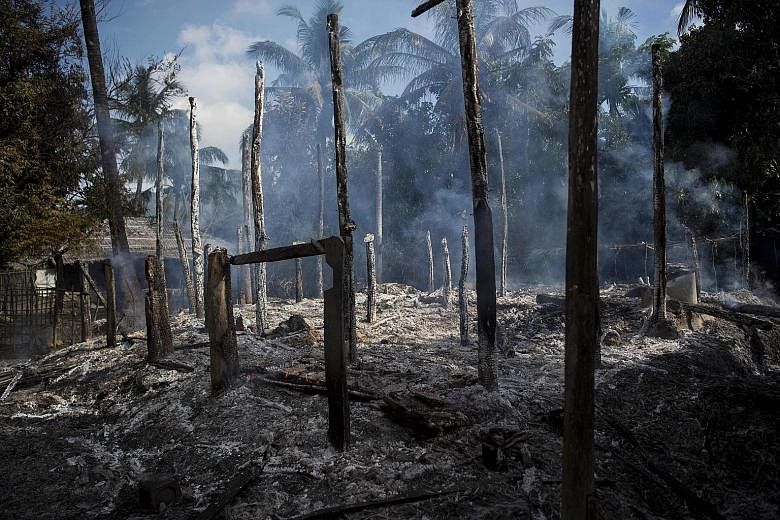KYOTO • The Myanmar government is responding to conflict in the troubled north of Rakhine state, which has suffered its worst violence since 2012, based on the rule of law, the country's leader, Ms Aung San Suu Kyi, was quoted as saying yesterday.
Ms Suu Kyi, a Nobel Peace Prize winner, has faced criticism abroad over her government's handling of the crisis in the Muslim-majority region, where soldiers have blocked access for aid workers and are accused of raping and killing civilians.
She has not commented directly on calls by human rights experts for the government to investigate the allegations of abuse, or on statements from human rights monitors, although she has urged the military to act with restraint.
Troops have poured into the area since militants believed to be Rohingya Muslims launched coordinated attacks on border posts on Oct 9, killing nine policemen. The government says five soldiers and at least 33 alleged attackers have been killed in the military operation.
In Japan on a five-day visit that included a meeting with Prime Minister Shinzo Abe, Ms Suu Kyi met Foreign Minister Fumio Kishida, who said violence could not be permitted in dealing with the crisis, a Foreign Ministry statement said.
"The problem in Rakhine state is extremely delicate and care is needed in responding," Ms Suu Kyi was quoted as saying. "The Myanmar government is responding to the issue of Rakhine state based on the principles of the rule of law."
Mr Kishida said Japan was giving one new and two used vessels to ease transport in Rakhine. On Wednesday, Mr Abe pledged US$7.7 billion (S$10.7 billion) to Myanmar over five years to support peace-building and development efforts.
The military operation has sharpened tensions between Ms Suu Kyi's six-month-old civilian administration and the army, which ruled the country for decades.
While Myanmar's army-drafted Constitution puts the military firmly in control of security matters, diplomats and aid workers say privately that they are dismayed at Ms Suu Kyi's lack of deeper involvement in the handling of the crisis.
Ms Suu Kyi received an honorary doctorate from Kyoto University for "advancement of democracy in Myanmar and in the world", and she told Japanese students and Myanmar citizens that difficulties in negotiating peace between armed ethnic groups stemmed from a lack of belief.
"Unity in diversity is not something that can be implemented just because you want to implement it," Ms Suu Kyi said in response to a question during a discussion at the university.
"It is a long process. It takes a lot of patience," she added, without referring to Rakhine. "We believe this is possible."
REUTERS

